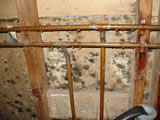DHHS → MeCDC → Public Health Systems → Local Health Officers → LHO Training → Section 5 → Solving the Problem
Local Health Officer Training
Section 5: Solving the Problem
Verify the complaint; if necessary, take action
Solving the Mold Problem at Turner House, Water Street, Westville, ME 04999
Once you have taken all the appropriate information (for instance, the name of the caller, phone number, address, others who can verify the complaint, name of the landlord, description of the problem, where is the moisture coming from, what was done, or not done to end the mold problem)
Professional investigations bring professional results.
As you continue with the mold investigation, visit the complainant's residence to verify that there is a mold problem and to interview the complainant. Take as many pictures as needed to document the situation. Include the town's CEO in your visits and discussions with the landlord and tenant. Even though rentals are private property, tenants have the right to permit a third party to enter their own apartment over the owner's objection.
 Speak to the owner about resolving the problem
Speak to the owner about resolving the problem
Introduce yourself and the CEO to the owner, explain that you received a complaint about mold growth in the apartment, and that you have examined and taken pictures of the affected area. Discuss the complaint with the property owner. Discuss the mold situation and why you believe that the mold growth is due to excessive presence of moisture. If the owner begins to understand the problem and has proposed a solution, ask the owner to put, in writing, his proposed solution and how he intends to resolve the problem as well as how much time he would need to complete the job. If the tenant is willing to tell the owner about the mold problem, you do not need to identify the complainant. However, if the tenant is reluctant to speak with the owner, but wants to remain anonymous, you should not disclose any information about the complainant, even though the owner may insist. Explain that the rules of confidentiality prevent you from sharing or disclosing the complainant's personal information.
Confidentiality has long been held as critical to gaining trust between parties. A key principle of ethically maintaining confidentiality is that the information must not be disclosed to the detriment of the complainant, but rather only to advance the complainant's interests, which means the LHO is prohibited from disclosing the information.
Recap:
-
Continue to take notes so you can document the conversation in a follow-up letter.
-
Tactfully inform the owner that you are relying on the Maine statutes – specifically, the "implied warranty" law and the "covenant of habitability" law - that deal with this type of situation. NOTE: Refer to these statutes:Title 14 �6021: IMPLIED WARRANTY AND COVENANT OF HABITABILITY,
[https://www.mainelegislature.org/legis/statutes/14/title14sec6021.pdf];
[Title 17, �2851: Dangerous buildings] -
If the owner refuses to abate the problem within the agreed timeline, you are required to inform the town officials of the refusal to remedy the situation. At that time the town officials would decide what course of action is appropriate, which may include remedying the problem at the owner's expense.
-
Inquire from the owner what his/her plans are, and that you will expect a written answer within three working days. Most likely the severity of the situation will dictate the length of time need to accomplish the tasks.
- Explain that if the owner fails to correct the situation, you will have no option but to immediately inform the town officials that the landlord is refusing to resolve the problem, and that the town may have to abate the problem at his/her expense.
Additional Materials
- Verify the Complaint Letter: (Word)
- Verify the Complaint Letter: (PDF)


